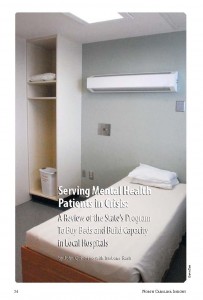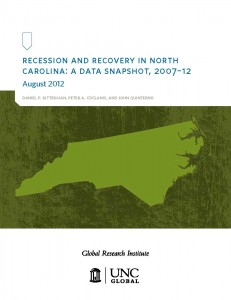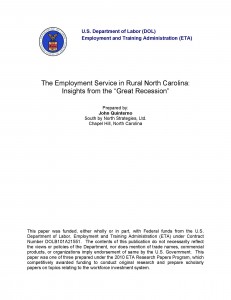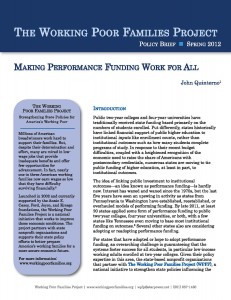Our Projects
South by North Strategies, Ltd. provides research, communication, and organizational services for firms seeking to understand and address economic and social issues. Services include quantitative and qualitative research, communications assistance, and organizational solutions.
Below are summaries of selected past projects. To learn more, contact South by North Strategies.





Our Projects
07.01.2013
Our Projects, Policy Points
The economic difficulties stemming from the Great Recession have demonstrated the short-run and long-run importance of public safety net and work support programs to families with children. At the same time, a variety of administrative and policy factors have constrained the effectiveness of such initiatives, thereby resulting in sizable numbers of low-income people failing to receive all of the assistance for which they are eligible. Heightened awareness of these shortcomings has sparked a variety of state-level reform efforts to strengthen and streamline public initiatives.
 To document the importance of public safety net programs and work supports, First Focus, a bipartisan children’s advocacy organization, commissioned South by North Strategies to prepare a report that documented the importance of eleven federal safety net and work support programs, identified the challenges facing those initiatives, and profiled some of the promising reform efforts underway in the states.
To document the importance of public safety net programs and work supports, First Focus, a bipartisan children’s advocacy organization, commissioned South by North Strategies to prepare a report that documented the importance of eleven federal safety net and work support programs, identified the challenges facing those initiatives, and profiled some of the promising reform efforts underway in the states.
Entitled A Stronger Safety Net for America’s Children, the report was funded by the Foundation for Child Development, a philanthropic organization in New York City. It also was the subject of a congressional briefing held in June 2013.
12.20.2012
Our Projects, Policy Points
In December 2012, the North Carolina Center for Public Policy Research, a nonprofit organization in Raleigh, released the first independent evaluation of a statewide initiative to provide crisis services to mental health patients in local hospitals across the state. The state-funded initiative, which began in 2008, aims to build mental health crisis capacities in  local communities through “three-way contracts” involving the state, local health management entities, and private and nonprofit hospitals.
local communities through “three-way contracts” involving the state, local health management entities, and private and nonprofit hospitals.
The evaluation concluded that the program has succeeded in achieving many of its goals yet could benefit from certain administrative improvements. A summary of findings is available here.
John Quinterno of South by North Strategies, Ltd. conducted the basic evaluation. That research involved analyses of administrative data, semi-structured interviews with a dozen stakeholders throughout North Carolina, and the preparation of a detailed evaluation report that the North Carolina Center for Public Policy Research published in its journal, North Carolina Insight.
09.04.2012
Our Projects, Policy Points
North Carolina’s labor market has struggled since late 2007. Consequently, the state’s next governor and legislature will face complicated choices regarding how best to steer the state back onto a path toward prosperity. To help inform that process, the Global Research Institute of the University of North Carolina commissioned South by North Strategies, Ltd. to  compile social and economic data tracing the state’s journey from recession to recovery between 2007 and 2012.
compile social and economic data tracing the state’s journey from recession to recovery between 2007 and 2012.
The research contributed to two policy reports. The first document, entitled Recession and Recovery in North Carolina: A Data Snapshot, 2007-12, explores significant ways in which the “Great Recession” has altered North Carolina’s labor market. The second report, entitled Moving Beyond Plato Versus Plumbing, discusses and contextualizes current policy debates over post-secondary education, analyzes occupational projections, and presents recommendations for helping young people with diverse talents succeed in today’s labor market.
Both reports were featured at the forum “Red States and Purple States: A Roundtable for Journalists,” which was organized by the UNC School of Journalism and Mass Communication and which took place on September 2, 2012 in Charlotte, North Carolina, in advance of the Democratic National Convention.
08.07.2012
Our Projects, Policy Points
Established in 1935, the North Carolina State Employment Service (ES) provides publicly-funded labor exchange services to all interested workers—both those with and without jobs—and to all interested firms in North Carolina. Services are delivered remotely and through a network of 90 local offices. Besides providing labor exchange services, the ES manages unemployment insurance claims at the local level on behalf of the Division of Employment Security, administers the “work test” required of insurance claimants,  and serves as a mandated partner in the state’s network of JobLink Career Centers, 63 percent of which are housed in ES offices.
and serves as a mandated partner in the state’s network of JobLink Career Centers, 63 percent of which are housed in ES offices.
To better understand the role that the ES played in rural communities during the height of the “Great Recession,” the Employment and Training Administration of the US Department of Labor, commissioned South by North Strategies to study the performance of the ES in rural communities between 2010 and 2011. Attention centered on the argument advanced by state policymakers that local ES offices ensure equal access to workforce investment services in rural communities. To that end, the study broke the argument into six distinct hypotheses and subjected each one to quantitative and qualitative examination. Specifically, the project documented the evolution of North Carolina’s service model, analyzed administrative data pertaining to service usage, and solicited stakeholder perspectives through semi-structured interviews. The study concluded by offering program recommendations and sketching avenues for future inquiry.
All of the findings are contained in a report entitled The Employment Service in Rural North Carolina: Insights from the “Great Recession,” which was released in August 2012.
06.13.2012
Our Projects, Policy Points
 States traditionally have tied funding for two- and four-year colleges and universities to student enrollment. Yet in recent years, prompted by state budget constraints and the need to increase the number of Americans with postsecondary credentials, states have begun tying public funding to an array of student outcomes–an approach known as performance funding.
States traditionally have tied funding for two- and four-year colleges and universities to student enrollment. Yet in recent years, prompted by state budget constraints and the need to increase the number of Americans with postsecondary credentials, states have begun tying public funding to an array of student outcomes–an approach known as performance funding.
In early 2012, The Working Poor Families Project, a national initiative to strengthen state policies influencing the well-being of low-income working families, commissioned South by North Strategies, Ltd. to prepare a policy brief summarizing the current state of performance funding.
The resulting report provides an overview of performance funding in the states, highlighting the importance of performance funding systems that cover all students, including non-traditional students, and values their progress and success in determining institutional funding. The brief concludes with policy recommendations for state policy organizations interested in ensuring that performance funding works for all students.
 To document the importance of public safety net programs and work supports, First Focus, a bipartisan children’s advocacy organization, commissioned South by North Strategies to prepare a report that documented the importance of eleven federal safety net and work support programs, identified the challenges facing those initiatives, and profiled some of the promising reform efforts underway in the states.
To document the importance of public safety net programs and work supports, First Focus, a bipartisan children’s advocacy organization, commissioned South by North Strategies to prepare a report that documented the importance of eleven federal safety net and work support programs, identified the challenges facing those initiatives, and profiled some of the promising reform efforts underway in the states.





 Email Sign-Up
Email Sign-Up RSS Feed
RSS Feed